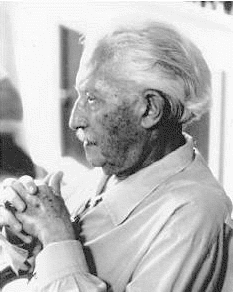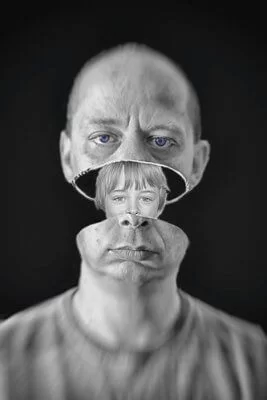Erikson Theory – Are You a Success at the ‘Stages of Life’?

photo by: Gita Krishnamurti
by Andrea M. Darcy
Are you on track in life, or do you have a sense you are less together than others around you? Not sure where it all went wrong? It can help to learn Erikson Theory.
What is Erikson Theory?
“Erikson Theory” is a set of eight stages of psychosocial development seen as essential to becoming a productive and well-balanced adult.
Created by developmental psychologist Erik Erikson, these life stages have maintained relevance for over fifty years.
The idea is that each stage presents a challenge to our growth, a battle of two opposites. We need the right support and environment to learn what we need to evolve and win the battle.
A clear example is the first stage we go through as an infant, of ‘Trust vs Mistrust’. Either we achieve the growth marker and trust others, or we spend our lives feeling we can’t have confidence in anyone.
What is the point of the eight life stages?
If we achieve a stage’s goal, we also earn a benefit that Erikson called a ‘virtue’. He is using the word in the way the Greek poets did, to refer to a strength. So, to again use that first example of ‘Trust vs Mistrust’, the virtue we gain is ‘Hope’. If we don’t learn trust, we end up feeling the opposite — hopeless.
If as adults we have problems coping, the eight life stages can help us see where things went wrong, and where we didn’t get the right environment or support to thrive. From there we can see what we need to work on.
Who was Erik Erikson?
 Erik Erikson was a tireless researcher, committed to understanding how exactly we become who we are. Even when he was already a well established and respected psychoanalyst and professor he continued to do field work, such as studying the ways various Native American tribes parented.
Erik Erikson was a tireless researcher, committed to understanding how exactly we become who we are. Even when he was already a well established and respected psychoanalyst and professor he continued to do field work, such as studying the ways various Native American tribes parented.
His restless pursuit of understanding might have been driven by his own childhood. Raised Jewish and with the name of his mother’s second husband, he was somehow tall, blonde and blue eyed. Teased, he always had identity issues. He learned later in life he was actually the product of an affair his mother had in her first marriage with a non-Jewish Dane.
What are the eight stages of psychological development?
The eight stages are:
- Trust vs Mistrust
- Autonomy vs. Shame
- Initiative vs. Guilt
- Industry vs. Inferiority
- Identity vs. Role Confusion
- Intimacy vs. Isolation
- Generativity vs. Stagnation
- Ego Integrity vs. Despair.
The stages in detail
1.Trust vs. Mistrust.
- Age: Infancy (birth to 2 years)
- Virtue: Hope
- Question: Can I trust this world I find myself in?
Needs: That your parents meet your basic needs, and that your main caregiver, such as your mother, models trustfulness of others and trustworthiness as a person. So you’d need warmth, affection, and consistency.
And if you don’t get that? Then you’ll end up with a sense of mistrust, lack of confidence, and suspicion of others.
Negative belief: the world is a dangerous place, I can’t depend on anyone or anything.

By: david pacey
2. Autonomy vs. Shame and Doubt.
- Age: Toddlerhood (2 to 4 years)
- Virtue: Will
- Question: Is it okay to be me?
Needs: patience and encouragement from the adults around you to explore and learn about your environment. To be allowed to try things for yourself, like washing and dressing yourself, while still having support. Not being left to do things you aren’t capable of.
And if you don’t get that? You can end up feeling unable to do things, ashamed of who you are, lesser than, or too dependent on others.
Negative belief: I am hopeless, I will never be good at anything, I can’t take care of myself.
3. Initiative vs. Guilt
- Age: Early Childhood (5 to 8 years)
- Virtue: Purpose
- Question: Is it okay to do things, act, move?
Needs: To be encouraged to think for yourself. To try to do things even though you feel confused and guilty. Develop a sense of judgement and an ability to plan. Take small risks, such as riding a bike without training wheels or crossing the street alone. To not be made to feel silly or annoying for things you want to try.
And if you don’t get that? You can always feel guilty about getting your needs and desires met.
Negative belief: I don’t deserve good things, nobody really likes me.
4. Industry vs. Inferiority.
- Age: Middle Childhood (9 to 12 years)
- Virtue: Competency
- Question: Can I really handle this world of other people and things?
Needs: To move out of just playing into actually being able to do projects and use your skills to take things to completion. You learn to have confidence in your skills, and to work alone as well as cooperate with others. You also develop a stronger sense of right and wrong and learn to respect differences in others. It’s really the era of independence, according to Erikson theory. You need to be allowed to explore your talents and potential.
And if you don’t get that? You can end up with low self-esteem and lack of interest or motivation in doing things and engaging with the world.
Negative belief: everything is pointless, I’ll never be good enough.

photo by: Jeswin Thomas
5. Identity vs. Role Confusion.
- Age: Adolescence (12 to 19 or longer)
- Virtue: Fidelity
- Question: Who am I, really, and what might I become?
Needs: To make decisions on who you are going to be in the world. Now you are moving away from depending on your parents and realise your life is going to be up to you. You decide on all parts of your identity: your sexual identity, your values, your occupation. How can you combine the person you are becoming with the expectations of society? You need to be able to experiment and explore your identities and to make your own choices.
And if you don’t get that? You can end up with an ongoing identity crisis. You never know what to commit to or be loyal to.
Negative belief: I am unacceptable as a I am.
6. Intimacy vs. Isolation.
- Age: Early Adulthood (20-39 years)
- Virtue: Love
- Question: Can I love others?
Needs: Erikson theory suggest we need to fit in, but we also need to be brave enough to overcome rejection and be ourselves regardless. We need to make commitments to others, to have healthy relationships where we give and receive, with friends and partners.
And if you don’t get that? You can deal with a constant sense of loneliness and feel like an outsider. This can mean ongoing depression and dark thoughts.
Negative belief: I am unloveable. There is something wrong with me. I am not like the others.
7. Generativity vs. Stagnation
- Age: Adulthood (40-59 years)
- Virtue: Care
- Question: Can I make my life count?
Needs: To contribute to society, to feel that you life has meaning, to feel productive. This doesn’t mean you have to do something huge. It can mean things like taking good care of your family, or participating in your community, or being a good citizen. You need to feel that what you do has value.
And if you don’t get that? You can feel constantly dissatisfied and like you are wasting your life.
Negative belief: life is pointless, nothing I do matters.
8. Ego Integrity vs. Despair
- Age: Late Adulthood (60 and over)
- Virtue: Wisdom
- Question: Was who I have been okay?
Needs: To be able to look at who you are are and what you did and feel okay with it. To have the inner strength to contemplate what we learned and attempted and achieved and be at peace with it.
And if I don’t get that? You can end up bitter and feeling disappointed and hopeless.
Negative belief: Everything was pointless.
How to use Erikson theory
Note that these stages were made over 50 years ago, and the age ranges might not be exact to today, where we tend, for example, to leave home and get married later. And different sources will have slightly different age ranges quoted. Human growth is not an exact science.
Nor is the idea to rigorously compare ourselves to this progression of growth, either. Some of us will go through these phases at a different time or several times, such as if we have an ongoing identity crisis.
The idea is more that they are phases we need to achieve to feel whole.
So if, for example, you didn’t get to develop trust as a child, you can then, as an adult, go through a period of learning to do so with a therapist, and then a new relationship.
Need help with a psychosocial stage you didn’t succeed at? It’s never too late. We connect you with some of London’s top therapists that can help. Or use our booking platform to find registered UK-wide therapists and online therapy you can do from any location.
Have a question about Erikson theory? Post below.
 Andrea M. Darcy is a writer trained in coaching and counselling. Find her or hire her @am_darcy
Andrea M. Darcy is a writer trained in coaching and counselling. Find her or hire her @am_darcy




